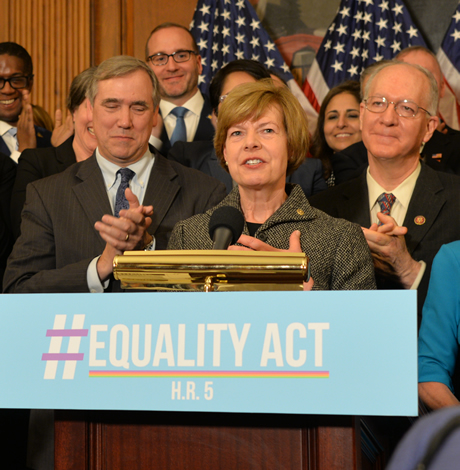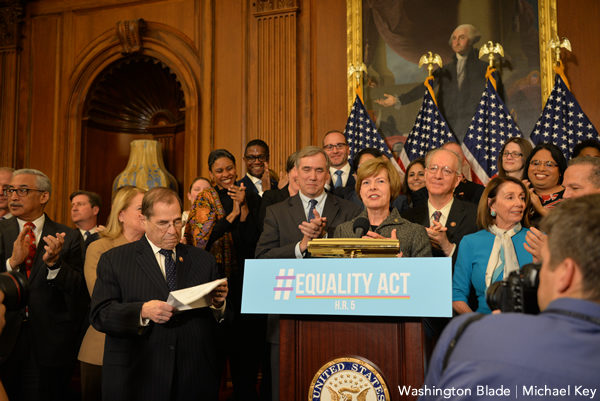National
Efforts to pass federal LGBTQ protections boosted with $6.5 million donation
Donations seek to duplicate success of marriage-equality movement


Efforts to pass a measure expanding the prohibition on discrimination against LGBTQ people under federal law have gotten a big boost with a nearly $6.5 million donation from a coalition of non-profits for an education campaign, the Washington Blade has learned exclusively.
The San Francisco-based Evelyn & Walter Haas, Jr. Fund coordinated the grants, which seek to duplicate the success of the movement that achieved same-sex marriage nationwide to enact federal non-discrimination protections this year.
The contributions are intended “to educate the public and policymakers about the need for a federal response to anti-LGBTQ discrimination,” according to a statement.
“It’s long past time for the federal government to respond to the profound harms caused by pervasive discrimination against LGBT people,” Cathy Cha, CEO of the Evelyn and Walter Haas, Jr. Fund said in a statement.
The Evelyn and Walter Haas, Jr. Fund for more than two decades has been at the forefront of supporting LGBTQ rights, including non-discrimination protections. It was the first foundation to embrace same-sex marriage as a priority and contributed more than $39 million to the marriage equality movement, according to a statement.
Other groups that have contributed to the $6.5 million in donations are the Gill Foundation, the Ford Foundation, Horizons Foundation, the Overbrook Foundation, the Pride Foundation and other philanthropic institutions. The contribution builds on the $1 million the Gill Foundation gave in support at the start of this year.
Scott Miller, co-chair of the Gill Foundation, said in a statement “the funders and advocates who helped win the right to marry for LGBTQ people have joined forces again and expanded our coalition in pursuit of equality for all Americans.”
“This alliance speaks to the unprecedented opportunity – and the long overdue need – to make sure everyone in this country is equal under the law,” Miller added.
The donations are announced as LGBTQ rights supporters are seeking to pass the Equality Act in Congress. The measure has cleared the House, but faces an uncertain future in the U.S. Senate, where 10 Republicans would be needed to overcome a filibuster.
The contributions, however, aren’t directed at passing the Equality Act per se because the contributors are 501(c)3 tax-exempt foundations and are unable to endorse any particular piece of legislation. The campaign is more generally geared toward supporting a solution for non-discrimination protections at the federal level.
Groups specifically seeking to pass the Equality Act, however, praised the $6.5 million as a welcome addition to the effort.
Kasey Suffredini, CEO of Freedom for All Americans, said in a statement the LGBTQ community is “closer than it has ever been to completing its nearly 50-year pursuit of nationwide nondiscrimination protections for all LGBTQ people.”
“Since the first federal non-discrimination measure was introduced in Congress in 1974, the generous contributions of foundations and major donors have powered our ability to show our fellow Americans who we are and challenges we face, opening hearts and changing minds in the process,” Suffredini said. “With a very short window to seize this once-in-a-generation opportunity, we are grateful again to these philanthropists for rising to the moment to carry our community over the finish line.”
In terms of where the money is going exactly, one-third of the Fund’s grants have been made to national organizations, including $800,000 to Freedom for All Americans Education Fund.
Additionally, money will go toward “empowering constituents to have conversations with lawmakers in more than 12 states, including Florida, Georgia, North Carolina, Ohio and Texas,” according to a statement. State groups are seen as key in the effort to convince moderate senators to support an LGBTQ non-discrimination measure.
Tyler Deaton, senior adviser of the American Unity Fund, echoed the praise for the donations. In addition to supporting the Equality Act, his organization is pushing for the Fairness for All Act, the Republican compromise measure for LGBTQ rights and religious freedom.
“This is the best moment we’ve ever had to win full freedom for LGBTQ Americans, and we can win as long as we come together with allies all across the political spectrum and respectfully address everyone’s reasonable concerns,” Deaton said.

The Comings & Goings column is about sharing the professional successes of our community. We want to recognize those landing new jobs, new clients for their business, joining boards of organizations and other achievements. Please share your successes with us at [email protected].
Congratulations to Gil Pontes III on his recent appointment to the Financial Advisory Board for the City of Wilton Manors, Fla. Upon being appointed he said, “I’m honored to join the Financial Advisory Board for the City of Wilton Manors at such an important moment for our community. In my role as Executive Director of the NextGen Chamber of Commerce, I spend much of my time focused on economic growth, fiscal sustainability, and the long-term competitiveness of emerging business leaders. I look forward to bringing that perspective to Wilton Manors — helping ensure responsible stewardship of public resources while supporting a vibrant, inclusive local economy.”
Pontes is a nonprofit executive with years of development, operations, budget, management, and strategic planning experience in 501(c)(3), 501(c)(4), and political organizations. Pontes is currently executive director of NextGen, Chamber of Commerce. NextGen Chamber’s mission is to “empower emerging business leaders by generating insights, encouraging engagement, and nurturing leadership development to shape the future economy.” Prior to that he served as managing director of The Nora Project, and director of development also at The Nora Project. He has held a number of other positions including Major Gifts Officer, Thundermist Health Center, and has worked in both real estate and banking including as Business Solutions Adviser, Ironwood Financial. For three years he was a Selectman, Town of Berkley, Mass. In that role, he managed HR and general governance for town government. There were 200+ staff and 6,500 constituents. He balanced a $20,000,000 budget annually, established an Economic Development Committee, and hired the first town administrator.
Pontes earned his bachelor’s degree in political science from the University of Massachusetts, Dartmouth.
Kansas
ACLU sues Kansas over law invalidating trans residents’ IDs
A new Kansas bill requires transgender residents to have their driver’s licenses reflect their sex assigned at birth, invalidating current licenses.

Transgender people across Kansas received letters in the mail on Wednesday demanding the immediate surrender of their driver’s licenses following passage of one of the harshest transgender bathroom bans in the nation. Now the American Civil Liberties Union is filing a lawsuit to block the ban and protect transgender residents from what advocates describe as “sweeping” and “punitive” consequences.
Independent journalist Erin Reed broke the story Wednesday after lawmakers approved House Substitute for Senate Bill 244. In her reporting, Reed included a photo of the letter sent to transgender Kansans, requiring them to obtain a driver’s license that reflects their sex assigned at birth rather than the gender with which they identify.
According to the reporting, transgender Kansans must surrender their driver’s licenses and that their current credentials — regardless of expiration date — will be considered invalid upon the law’s publication. The move effectively nullifies previously issued identification documents, creating immediate uncertainty for those impacted.
House Substitute for Senate Bill 244 also stipulates that any transgender person caught driving without a valid license could face a class B misdemeanor, punishable by up to six months in jail and a $1,000 fine. That potential penalty adds a criminal dimension to what began as an administrative action. It also compounds the legal risks for transgender Kansans, as the state already requires county jails to house inmates according to sex assigned at birth — a policy that advocates say can place transgender detainees at heightened risk.
Beyond identification issues, SB 244 not only bans transgender people from using restrooms that match their gender identity in government buildings — including libraries, courthouses, state parks, hospitals, and interstate rest stops — with the possibility for criminal penalties, but also allows for what critics have described as a “bathroom bounty hunter” provision. The measure permits anyone who encounters a transgender person in a restroom — including potentially in private businesses — to sue them for large sums of money, dramatically expanding the scope of enforcement beyond government authorities.
The lawsuit challenging SB 244 was filed today in the District Court of Douglas County on behalf of anonymous plaintiffs Daniel Doe and Matthew Moe by the American Civil Liberties Union, the ACLU of Kansas, and Ballard Spahr LLP. The complaint argues that SB 244 violates the Kansas Constitution’s protections for personal autonomy, privacy, equality under the law, due process, and freedom of speech.
Additionally, the American Civil Liberties Union filed a temporary restraining order on behalf of the anonymous plaintiffs, arguing that the order — followed by a temporary injunction — is necessary to prevent the “irreparable harm” that would result from SB 244.
State Rep. Abi Boatman, a Wichita Democrat and the only transgender member of the Kansas Legislature, told the Kansas City Star on Wednesday that “persecution is the point.”
“This legislation is a direct attack on the dignity and humanity of transgender Kansans,” said Monica Bennett, legal director of the ACLU of Kansas. “It undermines our state’s strong constitutional protections against government overreach and persecution.”
“SB 244 is a cruel and craven threat to public safety all in the name of fostering fear, division, and paranoia,” said Harper Seldin, senior staff attorney for the ACLU’s LGBTQ & HIV Rights Project. “The invalidation of state-issued IDs threatens to out transgender people against their will every time they apply for a job, rent an apartment, or interact with police. Taken as a whole, SB 244 is a transparent attempt to deny transgender people autonomy over their own identities and push them out of public life altogether.”
“SB 244 presents a state-sanctioned attack on transgender people aimed at silencing, dehumanizing, and alienating Kansans whose gender identity does not conform to the state legislature’s preferences,” said Heather St. Clair, a Ballard Spahr litigator working on the case. “Ballard Spahr is committed to standing with the ACLU and the plaintiffs in fighting on behalf of transgender Kansans for a remedy against the injustices presented by SB 244, and is dedicated to protecting the constitutional rights jeopardized by this new law.”
National
After layoffs at Advocate, parent company acquires ‘Them’ from Conde Nast
Top editorial staff let go last week

Former staff members at the Advocate and Out magazines revealed that parent company Equalpride laid off a number of employees late last week.
Those let go included Advocate editor-in-chief Alex Cooper, Pride.com editor-in-chief Rachel Shatto, brand partnerships manager Erin Manley, community editor Marie-Adélina de la Ferriére, and Out magazine staff writers Moises Mendez and Bernardo Sim, according to a report in Hollywood Reporter.
Cooper, who joined the company in 2021, posted to social media that, “Few people have had the privilege of leading this legendary LGBTQ+ news outlet, and I’m deeply honored to have been one of them. To my team: thank you for the last four years. You’ve been the best. For those also affected today, please let me know how I can support you.”
The Advocate’s PR firm when reached by the Blade said it no longer represents the company. Emails to the Advocate went unanswered.
Equalpride on Friday announced it acquired “Them,” a digital LGBTQ outlet founded in 2017 by Conde Nast.
“Equalpride exists to elevate, celebrate and protect LGBTQ+ storytelling at scale,” Equalpride CEO Mark Berryhill said according to Hollywood Reporter. “By combining the strengths of our brands with this respected digital platform, we’re creating a unified ecosystem that delivers even more impact for our audiences, advertisers, and community partners.”
It’s not clear if “Them” staff would take over editorial responsibilities for the Advocate and Out.




















